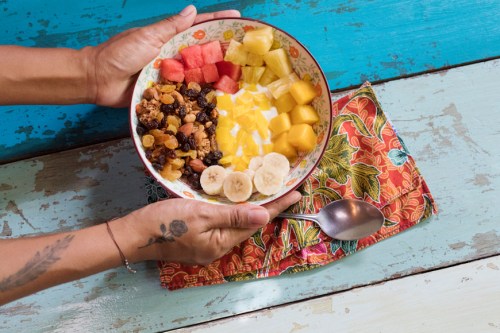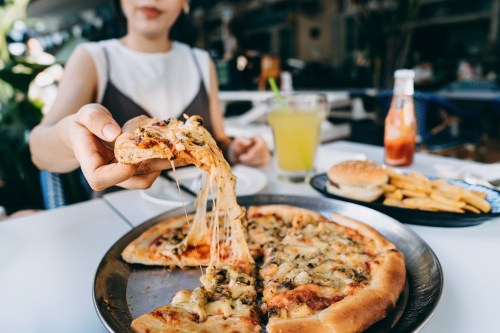In a perfect utopia, we wouldn’t have to think about pesticide residue hanging out on the rainbow of fruits and vegetables living in the produce section at the grocery store. But unless you have your own garden at home, for many, buying organic is the closest to avoiding food with the harmful residue. (The chemicals in pesticides have been linked to cancer, brain, and fetal damage, though the World Health Organization maintains that low intake levels are safe.)
Because it can be expensive to buy everything organic, the Environmental Working Group (EWG) releases an annual ranking of the produce items with the highest amount of pesticide residue (known as the Dirty Dozen) and the produce items with the least (aka the Clean 15).
“Each year the United States Department of Agriculture picks a subset of produce and food commodities and test them themselves in their own labs. For fresh fruits and vegetables, they peel them just like a consumer would do at home. The testing is meant to reflect what someone would experience eating at their own house,” explains Thomas Galligan, PhD, a toxicologist with the EWG. The EWG compiles the data on fresh produce and shares it with the public, so that consumers have a guide on what to prioritize buying organic. (Note: The EWG focuses specifically on the presence or absence of pesticides, not necessarily the quantities of pesticides detected—a position that can be misleading, according to a statement from the Alliance for Food and Farming.)
Today, the EWG released its 2020 Dirty Dozen and Clean 15 lists, and while there are a lot of usual suspects on the list, it turns out that one of the biggest pesticide offenders isn’t a fresh fruit or vegetable—it’s raisins.
Wait, what’s the Dirty Dozen? Here’s the low-down from a registered dietitian:
Why raisins were included in this year’s Dirty Dozen report
There are usually quite a few repeat offenders on the Dirty Dozen and Clean 15 lists. Strawberries, for example, consistently make the Dirty Dozen list. Spinach, nectarines, apples, peaches, and cherries all have steady spots as well. For the Clean 15, avocados, sweet corn, and pineapples have had the top spots the past two years. But this year, researchers for the first time tested raisins, and found that the vast majority of samples were highly contaminated with pesticides.
“Almost every sample of non-organic raisins tested, 99 percent, had residues of at least two pesticides,” Dr. Galligan says, adding that the EWG isn’t entirely sure why it’s so high in this food in particular. (One sample had as many as 26 different pesticides, and the average raisin sample was contaminated with 13 different pesticides.) Even organic raisins weren’t necessarily pesticide free; the report notes that 78 percent of organic raisins tested had a specific chemical called bifenthrin, which is technically not allowed for use in organic farming or production.
Interestingly, the USDA also tested prunes, which were much cleaner; this means not all dried fruit can be assumed to have the same level of pesticide residue. Raisins had more pesticide residue than grapes (the fruit from which they’re made), which is number six on the 2020 Dirty Dozen list. Again, Dr. Galligan says it’s a head-scratcher as to why.
Because the Dirty Dozen list ranks fresh produce items, raisins aren’t technically on it, but Dr. Galligan emphasizes that of the 47 foods that were tested, raisins’ amount of pesticide residue was highest, even more than strawberries, which is the top food on the below list:
The 2020 Dirty Dozen List
- 1. Strawberries
- 2. Spinach
- 3. Kale
- 4. Nectaries
- 5. Apples
- 6. Grapes
- 7. Peaches
- 8. Cherries
- 9. Pears
- 10. Tomatoes
- 11. Celery
- 12. Potatoes
Okay, so what’s on the 2020 Clean 15 list?
As far as the Clean 15 list, as you’ll see below, there aren’t many surprises, with avocados claiming their crown once again as the “cleanest” food. It seems that foods with an outer later of protection seem are less likely to have pesticide residue.
The 2020 clean 15 list
- 1. Avocados
- 2. Sweet corn
- 3. Pineapple
- 4. Onions
- 5. Papaya
- 6. Frozen sweet peas
- 7. Eggplants
- 8. Asparagus
- 9. Cauliflower
- 10. Cantaloupes
- 11. Broccoli
- 12. Mushrooms
- 13. Cabbage
- 14. Honeydew melon
- 15. Kiwi
While the lists are helpful to know what to prioritize what to buy organic, Nneka Leiba, the vice president of the EWG’s healthy living science program, says the hope is not to scare anyone off from eating fruits or vegetables. “While we encourage people to buy foods on the Dirty Dozen organic, we want to encourage people to eat fruits and vegetables regardless and also to wash them with water,” she says.
In the case of raisins, the organization recommends that people opt for fresh fruit or vegetables rather than raisins. And when nothing but raisins will do, they emphasize going for organic to minimize the risk of pesticide consumption. The more you know!
Here’s how the dangers of consuming pesticides compares to the dangers of eating bugs. And FYI, there might be pesticides in your honey, too.
Sign Up for Our Daily Newsletter
Get all the latest in wellness, trends, food, fitness, beauty, and more delivered right to your inbox.
Got it, you've been added to our email list.











